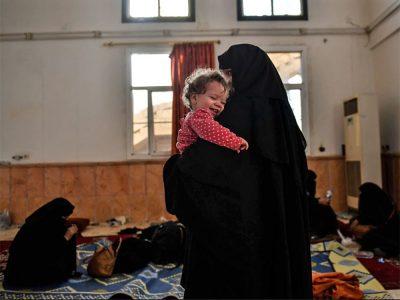
The jihadist plan to use women to launch the next incarnation of ISIS terrorist group
In recent months, female immigrants to the Islamic State have been fleeing the caliphate by the hundreds, eventually returning to their native countries or finding sanctuary in detention centers or refugee camps along the way. Some are mothers with young children who say they were pressured into traveling to Iraq or Syria to be with their husbands.
But a disturbing number appear to have embraced the group’s ideology and remain committed to its goals, according to interviews with former residents of the caliphate as well as intelligence officials and analysts who are closely tracking the returnees.
One of the scores of women to slip in and out of Morocco, unnoticed, calls herself Zarah. (She declined to give her family name because she had traveled to Syria in secret.)
“We will bring up strong sons and daughters and tell them about the life in the caliphate,” she said. “Even if we hadn’t been able to keep it, our children will one day get it back.”
From North Africa to Western Europe, the new arrivals are presenting an unexpected challenge to law enforcement officials, who were bracing for an influx of male returnees but instead have found themselves deciding the fate of scores of women and children. Few of the women fought in battle, yet governments are beginning to regard all as potential threats, both in the near term and well into the future.
Indeed, as the loss of the caliphate has appeared ever more certain, Islamic State leaders in recent weeks have issued explicit directions to female returnees to prepare for new missions that include carrying out suicide attacks and training offspring to become future terrorists.
Most of the women who have returned so far appear intent on resuming their old lives and putting the Islamic State behind them, officials say. But the fear among security experts is that some of the returnees continue to hold radical views and will seek to indoctrinate family members.
For many of the women returnees, the obligations appear to extend beyond the nurturing of future terrorists. In recent months, a growing number of women have been tapped to carry out military operations, both inside the caliphate and in their home countries.
Since the founding of the caliphate, Islamic State leaders have traditionally discouraged women from serving as warriors or suicide bombers. But as the losses have mounted, the group has given female followers a broader mandate to kill.
In the most prominent recent example, commanders ordered dozens of female suicide bombers to throw themselves against advancing government troops in a last-ditch effort to defend Mosul, the Islamic State’s Iraqi capital. In September 2016, the group’s Syrian leaders guided a cell of five French women in a foiled attempt to carry out a terrorist bombing in central Paris.
Although the Islamic State never disallowed attacks by women, the group now appears to be openly encouraging them, said Rita Katz, a terrorism analyst and founder of SITE.
“The new call from ISIS will even allow husbands and fathers to push their wives and daughters to carry out attacks,” Katz said. “I wouldn’t be surprised to see an increase of women in ISIS-inspired or coordinated attacks in the West and elsewhere.”
Anticipating such a turn, several European governments have begun toughening their laws for dealing with female returnees. In Belgium, France and the Netherlands, prosecution and imprisonment are all but guaranteed for men and women who joined the caliphate and now wish to return home.
But even time spent in prison won’t de-radicalize the returnees, European security experts say. Such fears are bolstered by years of research that shows the difficulty of reversing the effects of extremist indoctrination, said Thomas Renard, a Belgian terrorism expert and senior fellow at the EGMONT Royal Institute for International Relations, a Brussels think tank.
Even with the imposition of stricter laws and mandatory prison sentences, some returnees could remain under the Islamic State’s sway for years to come, he said.
Source: The Lily





